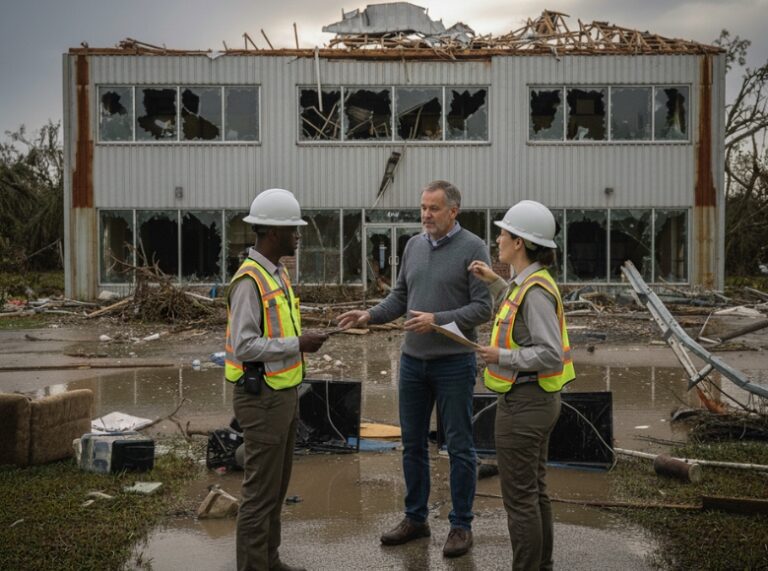We’re currently in the midst of the Atlantic hurricane season, the most dangerous time of year for residents in coastal states. Last year alone, several October storms caused widespread damage, leaving families and businesses scrambling to rebuild. Beyond immediate property damage, one of the biggest challenges comes after the storm passes: filing a hurricane insurance claim.
The process can quickly become overwhelming. Between piles of paperwork, inspections, and strict deadlines, even small mistakes can result in delayed or reduced settlements. Something as minor as missing a receipt or failing to photograph damaged items can significantly affect compensation. By understanding the hurricane insurance process in advance, claimants can navigate it efficiently, protect their finances, and avoid common errors that occur during storms.
First Steps After Hurricane Property Damage
Immediate action is critical after hurricane property damage. While instinct often drives people to call their insurer right away, documenting the damage first provides essential proof required to support a claim. Clear photographs and detailed videos create an accurate record before any cleanup begins. For example, snapping wide-angle photos of roof damage or filming a short video walkthrough of flooded rooms strengthens the claim.
Once documentation is complete, notify the insurer promptly. Most companies expect claims to be reported quickly, and some states enforce strict deadlines. Initial reporting should focus on essential details only, type of loss, date of the storm, and a brief description of damages. Full documentation can follow once the insurer opens the file. Early notification demonstrates good faith and helps prevent disputes later.
Review the Policy Before Filing a Hurricane Insurance Claim
Assuming all damages are automatically covered is a common mistake. Many hurricane insurance policies separate wind damage from flood damage, and deductibles often differ. A careful review of the policy ensures clarity on coverage, exclusions, limits, and definitions. For instance, knowing that temporary living expenses are covered could mean the difference between months of inconvenience or timely relocation after a storm.
Florida policyholders, in particular, should pay attention to hurricane-specific deductibles. Understanding these beforehand avoids unpleasant surprises when settlements are calculated. Policies may also include coverage for emergency repairs, like roof tarps or generator rentals. These expenses can be critical in the immediate aftermath of a storm.
Document Every Expense and Save Receipts
After a hurricane, families and business owners often spend money quickly to maintain safety or begin recovery. Items such as generators, tarps, hotel stays, or contractor fees can all count toward a hurricane damage insurance claim. Without receipts, insurers may deny reimbursement.
Organizing receipts in a dedicated folder or using apps like Evernote or Google Drive for digital records ensures all expenditures are tracked. Maintaining invoices from cleanup crews or repair services also strengthens the claim. Policyholders who meticulously record every expense increase their chances of full compensation.
Work Closely with the Adjuster but Remain Vigilant
Insurance adjusters work for the insurance company, not the policyholder. Their reports heavily influence settlement amounts, so active participation is essential. Walk through every damaged area with the adjuster, pointing out overlooked sections such as attic water stains, broken fences, or siding damage.
Maintaining your own copies of photos, videos, and repair estimates ensures your perspective remains part of the record. This dual documentation helps prevent disputes over undervalued claims. Think of it as creating a personal backup portfolio that supports your hurricane insurance claim.
Avoid Common Mistakes in a Hurricane Insurance Claim
Even experienced property owners often fall into the same traps. Three frequent errors include:
- Rushing to settle – Early offers may seem convenient, but they often undervalue the full cost of repairs.
- Delaying reports – Waiting weeks to file allows insurers to question the cause or extent of damage. Prompt filing protects your rights.
- Failing to verify coverage – Skipping a thorough policy review leads to surprises when exclusions are cited.
Learning from these mistakes keeps claimants vigilant and better prepared for negotiations.
Key Hurricane Insurance Claim Tips
Fall storms arrive when residents may already feel exhausted from prior hurricane activity. Rushed decisions can cost money. These hurricane insurance claim tips help maintain control:
- Keep multiple copies of photographs and store them digitally in case devices fail.
- Maintain a timeline of all communication with the insurer, noting dates, times, and representatives’ names.
- Request written confirmation of every promise the insurer makes.
- Compare the adjuster’s estimate with independent contractor quotes.
By following these steps, policyholders can negotiate settlements more effectively and ensure compensation covers the true cost of repairs.
The Role of Location: Hurricane Insurance Challenges in Florida
Florida residents face unique hurdles. Frequent storms create backlogs, while state regulations impose strict deadlines and separate hurricane deductibles. Filing a hurricane insurance claim in Florida requires extra diligence. Missing even a single step, such as a timely report or proper documentation, can delay payments for months, leaving families and businesses in prolonged uncertainty.
Filing a Hurricane Insurance Claim with Confidence
Preparation fosters confidence. Reviewing your policy before storm season, creating a detailed household inventory, and understanding deadlines allow for a faster, smoother process. Treating a hurricane insurance claim like a structured project, documenting, organizing, and following up, prevents mistakes that commonly derail settlements.
Claimants who maintain complete evidence files give insurers little reason to dispute or delay payments, positioning themselves for fair compensation.
Conclusion
Hurricanes leave devastation, but recovery depends on careful handling of the claim process. Filing a hurricane insurance claim requires speed, accuracy, and detailed documentation. Mistakes such as rushing settlements or skipping policy reviews can undermine months of effort.
By documenting damage, saving receipts, actively working with the adjuster, and following hurricane insurance claim tips, policyholders can navigate the process confidently and protect their financial future.
Continental Adjusters: Support for Hurricane Insurance Claims
Continental Adjusters provides expert guidance for policyholders recovering from hurricane property damage. Specialists manage complex claims, negotiate with insurers, and ensure settlements reflect actual losses. By reviewing policies, organizing documentation, and challenging undervalued estimates, Continental Adjusters helps clients avoid pitfalls that weaken a hurricane damage insurance claim.
For policyholders handling hurricane insurance claims, services include detailed claim preparation, strategic negotiation, and ongoing support throughout the process. When insurers delay or underpay, Continental Adjusters ensure fair outcomes.
Contact Continental Adjusters today to secure professional representation and prevent costly mistakes during recovery.



